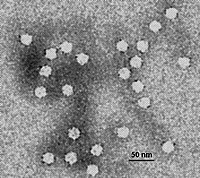
Photo from wikipedia
The oncolytic effect of Canine Parvovirus ns1 gene and Chicken Anemia vp3 gene in naturally occurring cases of Canine Transmissible Venereal Tumor (CTVT) is being reported. Dogs suffering from CTVT… Click to show full abstract
The oncolytic effect of Canine Parvovirus ns1 gene and Chicken Anemia vp3 gene in naturally occurring cases of Canine Transmissible Venereal Tumor (CTVT) is being reported. Dogs suffering from CTVT (N = 18) were systematically randomized into three groups viz. A, B, and C (n = 6). Animals of the groups A, B, and C received 100 µg of the ns1 gene, vp3 gene, and ns1 + vp3 gene combination, respectively, for three weeks intratumorally at weekly intervals; results were normalized against base values before commencement of therapy and after complete remission that were taken as negative and positive controls, respectively. Initiation of oncolytic gene therapy arrested the further progression of the tumor but most of the animals in the study underwent incomplete remission, indicating incomplete activity of ns1 and vp3 genes. The oncolytic effect of the treatments was in the order ns1 > vp3 > ns1 + vp3. Oncolysis was accompanied by decreased mitotic index and AgNOR count, and increased TUNEL positive cells and CD4+ lymphocyte counts. Our findings show that Canine Parvovirus ns1 may eventually find an important role as an oncolytic agent.
Journal Title: Scientific Reports
Year Published: 2017
Link to full text (if available)
Share on Social Media: Sign Up to like & get
recommendations!